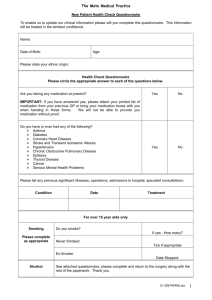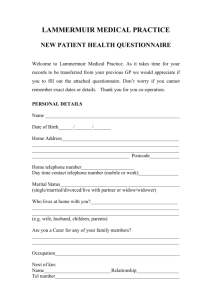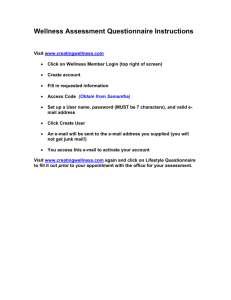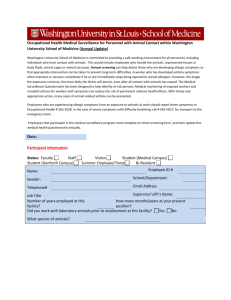ucla medical history questionnaire
advertisement
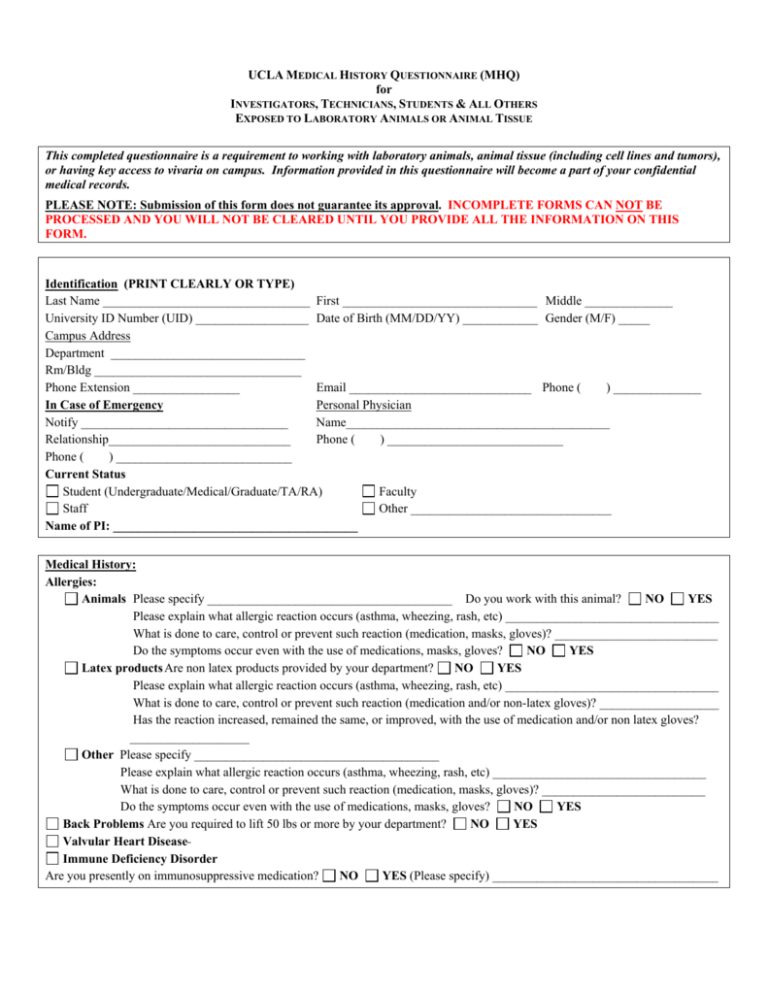
UCLA MEDICAL HISTORY QUESTIONNAIRE (MHQ) for INVESTIGATORS, TECHNICIANS, STUDENTS & ALL OTHERS EXPOSED TO LABORATORY ANIMALS OR ANIMAL TISSUE This completed questionnaire is a requirement to working with laboratory animals, animal tissue (including cell lines and tumors), or having key access to vivaria on campus. Information provided in this questionnaire will become a part of your confidential medical records. PLEASE NOTE: Submission of this form does not guarantee its approval. INCOMPLETE FORMS CAN NOT BE PROCESSED AND YOU WILL NOT BE CLEARED UNTIL YOU PROVIDE ALL THE INFORMATION ON THIS FORM. Identification (PRINT CLEARLY OR TYPE) Last Name _________________________________ First _______________________________ Middle ______________ University ID Number (UID) __________________ Date of Birth (MM/DD/YY) ____________ Gender (M/F) _____ Campus Address Department _______________________________ Rm/Bldg _________________________________ Phone Extension _________________ Email _____________________________ Phone ( ) ______________ In Case of Emergency Personal Physician Notify _________________________________ Name__________________________________________ Relationship_____________________________ Phone ( ) ____________________________ Phone ( ) ____________________________ Current Status Student (Undergraduate/Medical/Graduate/TA/RA) Faculty Staff Other ________________________________ Name of PI: _______________________________________ Medical History: Allergies: Animals Please specify _______________________________________ Do you work with this animal? NO YES Please explain what allergic reaction occurs (asthma, wheezing, rash, etc) __________________________________ What is done to care, control or prevent such reaction (medication, masks, gloves)? __________________________ Do the symptoms occur even with the use of medications, masks, gloves? NO YES Latex products Are non latex products provided by your department? NO YES Please explain what allergic reaction occurs (asthma, wheezing, rash, etc) __________________________________ What is done to care, control or prevent such reaction (medication and/or non-latex gloves)? ___________________ Has the reaction increased, remained the same, or improved, with the use of medication and/or non latex gloves? ___________________ Other Please specify _______________________________________ Please explain what allergic reaction occurs (asthma, wheezing, rash, etc) __________________________________ What is done to care, control or prevent such reaction (medication, masks, gloves)? __________________________ Do the symptoms occur even with the use of medications, masks, gloves? NO YES Back Problems Are you required to lift 50 lbs or more by your department? NO YES Valvular Heart Disease Immune Deficiency Disorder Are you presently on immunosuppressive medication? NO YES (Please specify) ____________________________________ UCLA MEDICAL HISTORY QUESTIONNAIRE for (Please Print Name) _________________________________ UID ______________ Do you work with HUMAN blood, body fluids or tissue (including cell lines and tumors)? NO YES, describe: ________________________________________________________ Risk of Injury (Check One) Note: Please refer to the Occupational Health website for complete information regarding zoonotic diseases (infections of animals which may be communicable to humans) involved when working with animals or in areas where animals are maintained. No Risk No contact with animals or animal tissues Low Risk Fish, amphibians, or reptiles Mild Risk Rats, mice, rabbits, guinea pigs, hamsters, gerbils, birds, and swine: mild risk of injury, zoonotic disease (salmonellosis, chlamydosis [psittacosis], lymphocytic choriomeningitis, and gastrointestinal parasites), but significant potential for allergies. Moderate Risk Dogs, cats, sheep, cattle, goats, bats, and wild rodents: moderate risk of injury, zoonotic disease (rabies, Q fever, hanta virus, bacterial and fungal infections), and significant potential for allergies. Note!!: Women who are pregnant or planning to become pregnant should be aware that working with cats may pose a danger to the fetus. Individuals with valvular heart disease should be aware that sheep are the primary species infected by Q-FEVER (Coxiella burnetti) in laboratory animal facilities. Infection with Q-fever can result in endocarditis on native or prosthetic cardiac valves and can result in relapsing systemic infection. Marked Risk Non-human primates: marked risk of injury, zoonotic disease (herpes B, tuberculosis, viral hepatitis, bacterial infections), gastrointestinal parasites, and some potential for allergies. When were you last vaccinated or tested for the following? Please note that current immunizations are required prior to approval of this Medical History Questionnaire. Occupational Health CAN NOT process your questionnaire unless you fill in the dates of your immunizations. Even if you completed this questionnaire in the past, you must fill in your vaccination dates again. Responses of “date unknown” or “childhood” can not be processed. Date (year) Tetanus (Required for ALL risk groups and must be within last 10 years) ________________ Hepatitis B (Recommended for individuals who deal with human blood, body fluids or tissues (including cell lines and tumors) (Please provide the vaccination series completion date or submit the Hepatitis B Declination form) ________________ Measles, Mumps & Rubella (Required for Marked Risk group-need proof of when last administered) ________________ Tuberculosis (Required for Marked Risk group-annual proof of TB skin test or TB questionnaire) ________________ CAUTION! Some infectious diseases, including certain zoonoses, are known to affect the fetus adversely. If you or someone in your household is pregnant or planning to become pregnant soon, please discuss your risk level with a healthcare professional at the Occupational Health Facility or Student Health Center, or your personal health care provider prior to working with animals. I certify that the information provided above is accurate to the best of my knowledge. Signature___________________________________________ Date_________________ PLEASE RETURN COMPLETED FORM TO: Occupational Health Facility 200 Medical Plaza, Suite 224 Campus Mail Code: 172524 Fax 310-206-4585 For questions regarding the MHQ, please contact the OHF Staff at 310-825-6771 (on campus x56771). ____________________________________________________________________________________________________ FOR OCCUPATIONAL HEALTH FACILITY USE ONLY Reviewed by________________________ Date _____________ Follow-Up NO YES Date _____________ Comments__________________________________________________________________________________________________ 2
